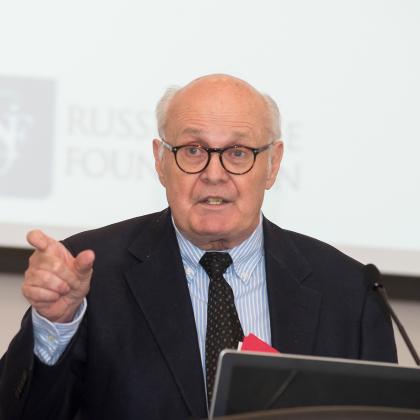James M. McPartland, long-serving former director of the Center for Social Organization of Schools at the Johns Hopkins University School of Education and a key figure in the development of the landmark 1966 Equality of Educational Opportunity Report—better known as the Coleman Report—died on Jan. 28. He was 84.

Image caption: James McPartland
Image credit: Will Kirk / Johns Hopkins University
A statistician by training and an education researcher, McPartland worked closely with James Coleman on the Coleman Report, which underpins the modern, evidence-based approach to improving education.
The Hub wrote about the Coleman Report at 50 years—and McPartland's role in shaping it—in 2016:
"Can you move to Washington tomorrow?"
This abrupt inquiry was posed one day in 1965 to James McPartland, then a graduate student at Johns Hopkins University. It came from his mentor, sociologist James Coleman.
And McPartland did head briskly to the capital, one of six scholars to join Coleman on a massive new research endeavor. Tasked by Congress, the team was to undertake the country's first meaningful investigation of civil rights issues in education. They had a year and a half.
"All of us knew the potential importance of this project from the beginning," recalls McPartland, now retired after decades as a JHU sociology professor. "There was a great spirit and intensity to it."
A half century after the landmark Equality of Educational Opportunity Report (EEOR) came out in July 1966, it remains known as one of the most influential education studies in American history. Defying conventional wisdom, its findings revealed that a student's background and family mattered more for their success than the quality of their school.
"Jim brought to his research on the sociology of education a powerful command of methodology as well as a passion for practical reform," Dean Christopher Morphew wrote in a message to the School of Education community on Friday. "He was also a warm and generous mentor of young researchers—someone who shared many memorable anecdotes about his part in the evolution of education research. One of these stories, involving him and a colleague leaving a crucial box of Coleman Report survey samples on the train, is the stuff of legend. (They recovered it, thank goodness.)"
The same year the report was issued, 1966, Coleman and Edward L. McDill launched the Center for Social Organization of Schools as an educational research and development center at JHU with the support of the U.S. Office of Education. McPartland and McDill were named co-directors.
"We were not only doing basic research studies about what the problems are and what potential solutions were, but the idea was to develop concrete solutions, a prototype model school, a prototype curriculum," McPartland said during a lengthy 2015 interview recorded and transcribed as part of the university's oral history project. "… And that was very unusual in social science departments. You did basic research, you published, kind of stayed at home. If you did lab work it was probably a contrived, simulated lab. So applied work and certainly doing development was not a very academic thing."
Over time, and under McPartland's leadership, CSOS grew into one of the nation's leading research centers supporting school improvement and student outcomes, home to a constellation of esteemed of education scholars. The center, which for many years was affiliated with JHU's Krieger School of Arts and Sciences, became part of the School of Education in 2009.
"At CSOS, Jim was an important, talented, and spirited part of our lives—director, colleague, professor, and friend—for over 40 years," said Joyce L. Epstein, an education policy expert and co-director of the Center on School, Family, and Community Partnerships at Hopkins. "His creative thinking and hard work ensured a continuous record of federally funded five-year grants that established an important direction in education research: RD&D—Research, Development, and Dissemination. He believed that strong studies could and should help improve school policy and practice—a legacy that continues to define CSOS to this day.
"Jim studied important topics: the impact of desegregated schools; the importance of student roles and responsibilities; the design and effects of different school organizations; the development of more effective high schools for underserved students.
"His wit and wisdom were appreciated by all who were fortunate enough to work with him over the years."
McPartland authored numerous research studies on the equality of educational opportunities and the process of whole school reform, and he was elected as a fellow of the American Educational Research Association in 2009. McPartland earned bachelor's and master's degrees from Cornell University and a doctorate in sociology from Johns Hopkins.
Services were held Monday in Baltimore.
Posted in University News
Tagged education, obituaries, coleman report







